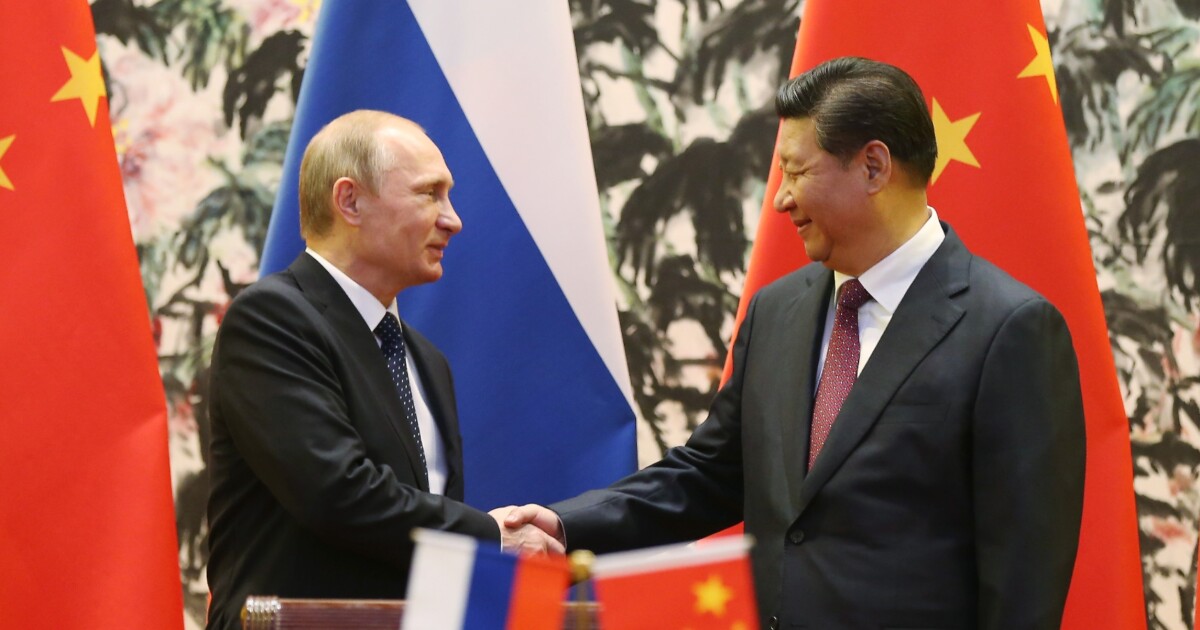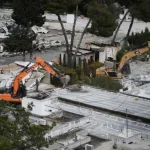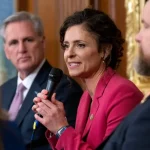

The Chinese government has spent the last year parroting Russia’s justifications for its invasion of Ukraine, including spreading disinformation and echoing Kremlin critiques of NATO, as it gives rhetorical and political support to Russia.
The DragonBear alliance, as it has become known, has reached a point that top global officials have called out Beijing’s stance. NATO Secretary-General Jens Stoltenberg noted over the weekend that “China has not been able to condemn the invasion.” Secretary of State Antony Blinken said on Monday that “we are concerned that China is considering supporting Russia’s war effort in Ukraine with lethal assistance.”
CHINA PUSHES CONSPIRACY THEORY THAT COVID-19 ORIGINATED AT MARYLAND’S FORT DETRICK
In response, Chinese Foreign Affairs Ministry spokesman Wang Wenbin said the United States was “deflecting the blame and spreading disinformation.” China has attempted to present itself as a peace mediator in Russia’s war against Ukraine while amplifying Kremlin narratives attempting to justify the war and pointing the finger at the U.S.
“It is the U.S., not China, that has been pouring weapons into the battlefield. The U.S. is in no position to tell China what to do. We would never stand for finger-pointing, or even coercion, and pressurizing from the U.S. on our relations with Russia,” Wenbin said. “On the Ukraine issue, China’s position boils down to supporting talks for peace.”
Wenbin also suggested the U.S. played a role in blowing up the Nord Stream pipelines — something China has repeatedly hinted at as it echoes allegations from the Kremlin. The U.S. has repeatedly denied playing any role, with the White House calling it “utterly false and complete fiction.”
This is all part of a long pattern. While claiming it stands for “peace” in Ukraine, the Chinese government repeatedly blamed the U.S. for violence in Ukraine, variously blaming Western exuberance over the collapse of the Soviet Union during the Cold War, NATO’s membership expansion, and the U.S.’s provision of weaponry to Ukraine.
Russian President Vladimir Putin and Chinese leader Xi Jinping met at the start of the Beijing Winter Olympics in early February 2022 to announce a broad strategic partnership “without limits” amid Russia’s military buildup on Ukraine’s border.
The New York Times reported that “a Western intelligence report said senior Chinese officials told senior Russian officials in early February 2022 not to invade Ukraine before the end of the Winter Olympics in Beijing.” Wenbin called this “fake news” and said the “blame-shifting is despicable” as he pointed his finger at “the culprits of the crisis,” the U.S. and the West, and blamed them for “expanding NATO up to Russia’s borders.”
The day before Putin’s invasion, Chinese Foreign Affairs Ministry spokeswoman Hua Chunying said: “When the U.S. drove five waves of NATO expansion eastward all the way to Russia’s doorstep … did it ever think about the consequences of pushing a big country to the wall?”
Once the full-scale invasion launched, China carefully avoided condemning Russia, and the U.S. criticized China for its “at least tacit approval” of Russia’s invasion. China repeatedly echoed Russia’s language claiming the attack on Ukraine was just a “special military operation” and refusing to call it an “invasion.” Chinese Ambassador to Russia Zhang Hanhui said in August 2022 that the U.S. was “the architect and main instigator of the Ukrainian crisis.”
And Li Zhanshu, who was at the time the No. 3 official in the Chinese Communist Party, visited Russia in September 2022 and declared, “The United States and NATO are directly pushing at Russia’s doorstep. … It can be said that Russia has been cornered. In this case, Russia is taking a counterattack in order to safeguard the core interests of the country.”
The Russian government and media outlets ramped up claims in March 2022 that the U.S. military was operating bioweapon research facilities in Ukraine, with Chinese diplomats and propaganda outlets also amplifying the story. The U.S. has consistently denied the baseless claims, and Russia has never provided any proof. China’s then-Ambassador to the U.S. Qin Gang said in May 2022 that it is “naive” to ask why Xi wasn’t condemning Putin’s invasion. But he insisted: “China is part of the solution. It’s not part of the problem.”
Russian Foreign Minister Sergey Lavrov traveled to China in March 2022 and met with Chinese Foreign Affairs Minister Wang Yi, who blamed the war in Ukraine in part on “accumulated European security contradictions” and “Cold War thinking.” The Chinese official also said Moscow and Beijing are now “more determined” to build their strategic partnership, even during the Ukraine invasion.
China abstained from a United Nations Security Council resolution condemning the Russian invasion in late February 2022 (the Kremlin vetoed it), abstained from a U.N. General Assembly vote in March 2022 condemning the invasion, voted against a U.N. Human Rights Council resolution in May 2022 calling for an independent inquiry into Russian war crimes, voted against a World Health Organization resolution in May 2022 condemning Russia for creating a health emergency in Ukraine, and abstained from a U.N. Security Council resolution condemning Russia’s attempted annexation of parts of Ukraine in October 2022.
Putin and Xi spoke at the end of December 2022, reaffirming their alliance. Despite claims by some that China was backing off of its embrace of Russia because of the way the Ukraine invasion had done, both leaders claimed their friendship was stronger than ever.
The Russian leader repeatedly touted the enduring “Russian-Chinese strategic partnership” as he praised “Dear Mr. Chairman” Xi and China’s economic support for Russia during the war.
“Military and military-technical cooperation, which contributes to ensuring the security of our countries and maintaining stability in key regions, occupies a special place in the entire range of Russian-Chinese cooperation and our relations,” Putin also said. “We aim to strengthen cooperation between the armed forces of Russia and China.”
CLICK HERE TO READ MORE FROM THE WASHINGTON EXAMINER
Xi called Putin “my dear friend” and said he was “very glad to see you again.”
“Under our joint leadership, China-Russia comprehensive partnership and strategic interaction in the new era is showing maturity and resilience,” Xi said. “In the face of a difficult and far from unambiguous international situation, we are ready to build up strategic cooperation with Russia.”





